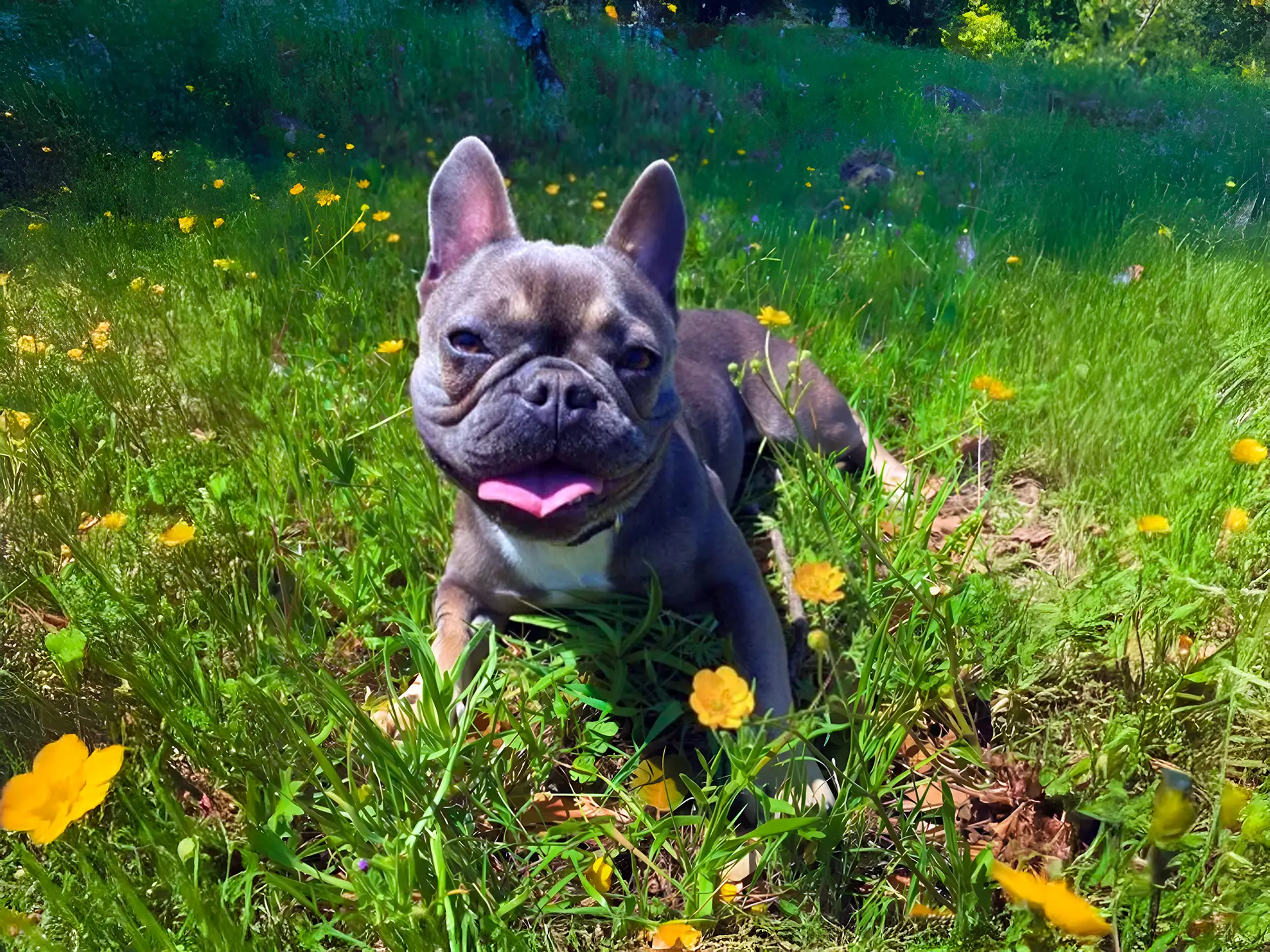French Bulldog Dog Breed Info & Overview
Meet the French Bulldog, a small but sturdy companion known for its bat-like ears and affectionate nature. This breed combines a playful spirit with a laid-back attitude, making it perfect for city dwellers and families alike. With their charming personalities and minimal exercise needs, French Bulldogs are an ideal choice for those seeking a loving, low-maintenance pet.
Characteristics
Pictures
Breed History
Imagine lace workers in 19th-century England, crafting intricate patterns with small, loyal bulldogs at their feet. These compact canines were bred as companions, offering warmth and affection. When the Industrial Revolution prompted many artisans to relocate to France, their four-legged friends accompanied them, sparking a canine cultural exchange.
In France, these bulldogs were crossbred with local dogs, possibly terriers and pugs, resulting in the adorable bat-eared breed we know today. Quickly gaining favor among artists, writers, and high society, French Bulldogs became the quintessential Parisian pet—equal parts charm and sophistication.
By the late 1800s, their popularity had crossed the Atlantic, winning the hearts of American socialites. Recognized by the American Kennel Club in 1898, the French Bulldog’s rise from humble beginnings to global stardom is a testament to their irresistible appeal and adaptability.
Temperament, Personality
French Bulldogs are the perfect blend of affection and humor. Known for their comical expressions and playful antics, they bring joy to every moment. Whether it’s zooming around the living room or curling up for a cuddle, they love being at the center of family life.
With children, Frenchies are patient and gentle, making them excellent playmates. They also coexist well with other pets, though their love of attention might make them a bit jealous. Their adaptable nature makes them equally suited to energetic families or laid-back singles.
Frenchies are known to be charmingly stubborn but are always eager to please their favorite humans. Their playful yet calm demeanor makes them a great fit for a variety of households. Just be prepared to laugh at their quirky habits—they’re little clowns in disguise.
Physical Characteristics
The French Bulldog may be small, but their presence is anything but. With their iconic bat ears and expressive eyes, they’re impossible to miss. Their compact, muscular build speaks to their Bulldog ancestry, while their smooth, soft coat adds a touch of elegance.
Frenchies come in a variety of colors, including fawn, brindle, cream, and pied (white with dark patches). Their square heads, short muzzles, and wrinkled foreheads give them a distinctive, endearing look. Their naturally short tails—straight or corkscrew—complete their unique appearance.
Standing just 11–12 inches tall and weighing around 16–28 pounds, French Bulldogs are the epitome of “big personality in a small package.” Their sturdy frames and confident strides make them as captivating as they are lovable.
Health Issues
French Bulldogs are as adorable as they are delicate. Their brachycephalic (flat-faced) structure can lead to respiratory issues, making them sensitive to heat and strenuous exercise. Keep them cool, calm, and collected, especially during warmer months.
Skin problems are another consideration. Their signature wrinkles need regular cleaning to prevent irritation or infections. Frenchies are also prone to eye conditions like cherry eye and cataracts, so routine vet visits are essential for monitoring their health.
Joint and spinal problems, including hip dysplasia and intervertebral disc disease, can also affect this breed. Feeding them a healthy diet, maintaining a proper weight, and avoiding high-impact activities can reduce strain on their joints. With attentive care, Frenchies can live happy, comfortable lives.
Grooming Needs
French Bulldogs are as low-maintenance as they are lovable when it comes to grooming. Their short, smooth coats only need a weekly brushing to keep them looking sleek and to manage moderate shedding. Use a soft brush or grooming mitt for best results.
Pay close attention to their iconic facial folds. These need regular cleaning with a damp cloth to prevent moisture buildup, which can lead to infections. After cleaning, make sure to dry the folds thoroughly to keep their skin healthy.
Their nails grow quickly, so regular trims are a must to prevent discomfort. Check their ears for wax buildup or debris, and clean them gently as needed. Finally, brushing their teeth several times a week helps maintain good oral health and keeps their signature smiles bright.
Exercise Requirements
French Bulldogs might not be marathon runners, but they still enjoy bursts of activity. Daily walks and light play sessions totaling about 30 minutes are typically enough to keep them fit. They’re excellent indoor playmates, especially when the weather isn’t cooperating.
Due to their flat faces, Frenchies are prone to overheating and should avoid strenuous exercise, particularly in hot or humid conditions. Keep walks leisurely and carry water to keep them hydrated. Their playful personalities often shine through games like fetch or tug-of-war.
Mental stimulation is just as important as physical exercise. Puzzle toys and interactive games keep their sharp minds engaged and prevent boredom. A balanced routine of moderate activity and relaxation is the key to a happy, healthy Frenchie.
Training Tips
Training a French Bulldog requires patience, consistency, and a good sense of humor. These clever dogs can be a bit stubborn, so positive reinforcement works best. Treats, praise, and enthusiastic encouragement will keep them motivated.
House training might take time, so establish a consistent schedule and be prepared for accidents early on. Short, engaging training sessions are more effective than long ones, as Frenchies tend to lose focus. Use variety to keep them interested—repetition can bore them.
Socialization is essential to help them become well-mannered adults. Expose them to different people, environments, and other animals early on. With their natural charm and eagerness to please, Frenchies can excel in obedience training when approached with patience and positivity.
Nutrition, Diet
A French Bulldog’s diet should be tailored to their unique needs. They typically require 1–1.5 cups of high-quality dry dog food daily, split into two meals. Look for a formula designed for small breeds, as it provides the right balance of nutrients and kibble size.
Due to their predisposition to obesity, portion control is crucial. Overweight Frenchies can develop joint and respiratory issues, so avoid overindulging them with treats. Incorporating omega fatty acids in their diet supports healthy skin and a shiny coat.
Some French Bulldogs may have food sensitivities. If you notice digestive issues or skin irritations, consult your veterinarian about hypoallergenic or limited-ingredient diets. Fresh water should always be available to keep them hydrated, especially after exercise.
Adoption, Breeders
If you’re considering a French Bulldog, finding the right source is critical. Reputable breeders prioritize health and temperament, conducting screenings for common genetic issues. The American Kennel Club is a reliable resource for finding ethical breeders.
Adoption is a wonderful alternative. Organizations like the French Bulldog Rescue Network specialize in rehoming Frenchies in need of loving families. Rescuing a dog offers a chance to give them a second shot at happiness.
Avoid purchasing from puppy mills or online sellers with unclear breeding practices. Thorough research ensures your Frenchie comes from a responsible source, setting the stage for a healthy and fulfilling companionship.
Family Pet?
French Bulldogs are exceptional family pets, adored for their affectionate and gentle nature. They’re fantastic with children, often forming strong bonds with the youngest members of the family. Their patience and playful demeanor make them ideal for family life.
They also get along well with other pets, especially when socialized early. Their minimal barking and adaptable nature make them great companions for apartment dwellers. Whether in a bustling household or a quieter home, Frenchies thrive on human connection.
Their small size and moderate activity needs mean they don’t require large spaces, but they do need plenty of love and attention. For families seeking a loyal and entertaining companion, the French Bulldog is an excellent choice.
Right For You?
If you’re searching for a dog that’s affectionate, adaptable, and low-maintenance, the French Bulldog might be your perfect match. They’re ideal for individuals, couples, seniors, or families who can provide companionship and moderate exercise.
Their health needs require attentive care, so potential owners should be prepared for potential medical expenses. Frenchies are happiest in homes where they can be the center of attention, whether in a city apartment or suburban home.
If you’re ready to welcome a charming and devoted companion into your life, the French Bulldog could be the perfect fit. They bring endless love and laughter to any household lucky enough to have them.
Conclusion
The French Bulldog is a delightful mix of charm, humor, and affection. Perfect for those seeking a laid-back yet playful companion, they adapt seamlessly to various lifestyles. With their unique appearance and lovable personality, Frenchies are sure to steal your heart—and your couch!
FAQs
-
Do French Bulldogs snore a lot?
Yes, French Bulldogs are prone to snoring due to their brachycephalic (short-nosed) structure. Their narrow airways make snoring common, especially when sleeping on their back. Providing a supportive bed and monitoring their sleeping posture can reduce the frequency.
-
How well do French Bulldogs tolerate hot weather?
French Bulldogs are sensitive to heat and can quickly overheat due to their flat faces. They should avoid outdoor activity during peak heat and always have access to fresh water and shaded areas. Cooling vests or mats can help keep them comfortable.
-
Do French Bulldogs drool a lot?
While French Bulldogs aren’t heavy droolers, they may drool when excited, after eating, or in hot weather. Regularly wiping their mouth and keeping their folds clean prevents any related skin irritation.
-
Can French Bulldogs swim?
No, French Bulldogs are not natural swimmers due to their short legs and heavy, muscular bodies. They can easily sink, so they should always be supervised near water and wear a life vest if swimming is attempted.
-
What’s the best type of toy for a French Bulldog?
French Bulldogs enjoy durable chew toys and interactive puzzle games. Due to their strong jaws, toys should be tough enough to withstand chewing and small enough for their mouths but not a choking hazard.
Breed Ratings
French Bulldogs are moderately intelligent. They can learn commands and tricks but may show stubbornness during training.
They are playful and enjoy engaging in games and activities, especially with their family members.
With a low to moderate energy level, Frenchies are content with minimal daily exercise and enjoy lounging around.
Shedding is moderate. Regular brushing helps manage loose hair and keeps their coat looking its best.
They have a low prey drive and are less likely to chase after small animals, making them suitable around other pets.
Their short coat requires minimal grooming, though special attention is needed for cleaning facial wrinkles.
Training requires patience due to occasional stubbornness. Positive reinforcement yields the best results with this breed.
They prefer company and may become anxious if left alone for long periods.
French Bulldogs are typically quiet and don't bark excessively, which is great for apartment living.
Moderate droolers, especially after eating or drinking. Keeping a cloth handy can help manage this trait.
Generally sociable with other dogs, especially when properly socialized from a young age.
Prone to breed-specific health issues. Regular veterinary care and a healthy lifestyle are essential for their well-being.












